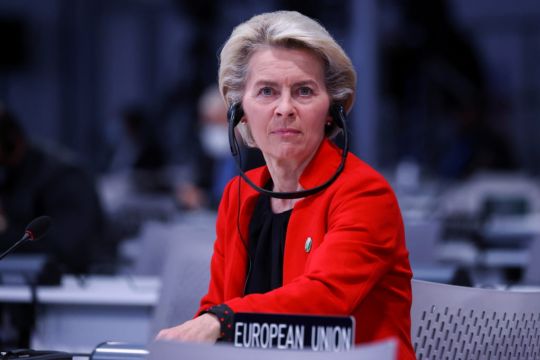Russia’s aggression in Ukraine is a direct threat to Europe’s security, European Commission president Ursula von der Leyen said during a visit to India.
“Targeting and killing innocent civilians. Redrawing borders by force. Subjugating the will of a free people. This goes against core principles enshrined in the UN Charter,” Ms von der Leyen said in a speech to the Raisina Dialogue, a geopolitics conference in New Delhi. “In Europe, we see Russia’s aggression as a direct threat to our security.”
She said Moscow’s “unprovoked and unjustified aggression against Ukraine” was bound to be a “strategic failure” and the European Union was “doing all we can to help Ukraine fight for its freedom”.
“This is why we needed to impose massive, sharp and effective sanctions,” she added.
Russia's aggression already has an impact on the Indo-Pacific.
Countries battered by the pandemic now must deal with rising prices for grain, energy and fertilizers as a result of it.
Our response to Russia’s war will decide the future of our global system and economy. pic.twitter.com/uYiGfEBVcnAdvertisement— Ursula von der Leyen (@vonderleyen) April 25, 2022
She said that sanctions, however, were not “standalone solutions” but part of a broader strategy that gives the European Union leverage to “achieve a diplomatic solution that will bring lasting peace”.
Ms von der Leyen arrived in India on Monday for a two-day visit. She met Indian Prime Minister Narendra Modi and discussed trade, climate and digital technology, foreign ministry spokesperson Arindam Bagchi said.
Her visit to India is seen as part of western efforts to encourage New Delhi to reduce ties with Russia in response to its invasion of Ukraine.
Mr Modi has called the situation in Ukraine “very worrying” and has appealed to both sides for peace. But India has so far refrained from condemning Russia’s invasion. It also abstained when the UN General Assembly voted this month to suspend Russia from the Human Rights Council.
Energy security is one of the most pressing topics for India and Europe.
The EU will diversify away from Russian fossil fuels and will invest heavily in clean renewable energy.
So 🇪🇺🇮🇳 cooperation on solar and green hydrogen is key.#GlobalGateway can play a crucial role here. pic.twitter.com/StsFj7T5UV— Ursula von der Leyen (@vonderleyen) April 25, 2022
India has also resisted western pressure to avoid buying oil from Russia.
India receives relatively little of its oil from Russia, but ramped up purchases recently because of discounted prices. India is also a major buyer of Russian weapons, and recently purchased advanced Russian air defence systems.







